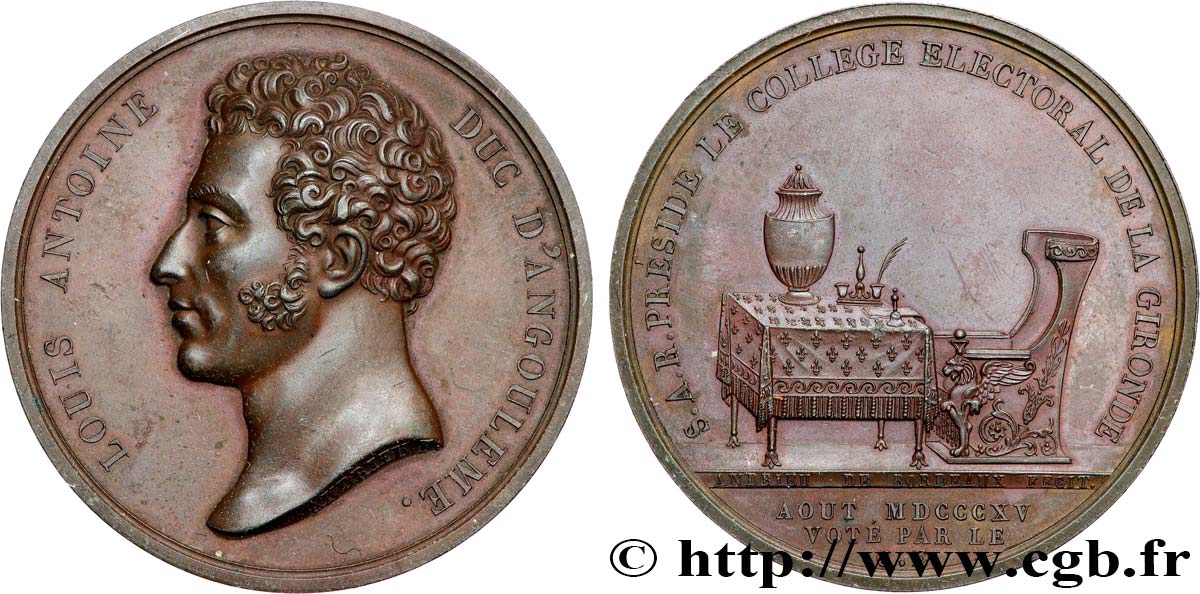Live auction - fme_897899 - LOUIS XVIII Médaille, Louis-Antoine d'Artois duc d'Angoulême, Présidence du collège électoral
You must signin and be an approved bidder to bid, LOGIN TO BID. Accounts are subject to approval and the approval process takes place within 48 hours. Do not wait until the day a sale closes to register. Clicking on "BID" constitutes acceptance of the terms of use of cgb.fr private live auctions.
Bids must be placed in whole Euro amounts only. The sale will start closing at the time stated on the item description; any bids received at the site after the closing time will not be executed. Transmission times may vary and bids could be rejected if you wait until the last second. For further information check the Live auction FAQ
All winning bids are subject to a 18% buyer’s fee.
All winning bids are subject to a 18% buyer’s fee.
| Estimate : | 80 € |
| Price : | 51 € |
| Maximum bid : | 71 € |
| End of the sale : | 13 February 2024 16:27:56 |
| bidders : | 2 bidders |
Type : Médaille, Louis-Antoine d'Artois duc d'Angoulême, Présidence du collège électoral
Date: 1815
Mint name / Town : 33 - Bordeaux
Metal : copper
Diameter : 40,5 mm
Orientation dies : 12 h.
Engraver ANDRIEU Jean-Bertrand (1761-1822)
Weight : 36,16 g.
Edge : lisse
Puncheon : sans poinçon
Coments on the condition:
Patine marron hétérogène, présentant des traces de manipulation. Présence de quelques rayures
Obverse
Obverse legend : LOUIS ANTOINE - DUC D’ANGOULEME.
Obverse description : Tête à gauche du Duc d’Angoulème, signé sur le tranché du cou : ANDRIEU F..
Reverse
Reverse legend : S.A.R. PRESIDE LE COLLEGE ELECTORAL DE LA GIRONDE // SUR LA PLINTHE : ANDRIEU DE BORDEAUX FECIT // AOUT MDCCCXV / VOTE PAR LE C.E..
Reverse description : Bureau et chaise, avec une urne et un encrier sur le bureau.
Commentary
La Gironde est le nom donné à un groupe politique de la Révolution française qui fut majoritaire à l’Assemblée législative (en face des Montagnards) et à la Convention nationale, leurs députés étant issus de la région de Bordeaux.
Médaille signée ANDRIEU DE BORDEAUX REGIT sur la ligne d’exergue au revers, et ANDRIEU sur la base du cou au droit.
Louis-Antoine d’Artois, né le 6 août 1775 à Versailles, France, et mort à Görz, Autriche — actuellement Nova Gorica (Slovénie) — le 3 juin 1844, petit-fils de France et duc d’Angoulême (1775-1824), puis Louis-Antoine de France, dauphin de France (1824-1830) puis « comte de Marnes » (1830-1844), puis en 1836 Louis de France, est un prince de la maison royale de France, fils de Charles-Philippe de France, ce dernier étant comte d'Artois et le futur roi Charles X, et de Marie-Thérèse de Savoie.
Lors des événements de la révolution de Juillet (1830), peu après l’abdication de son père Charles X, il renonce lui-même à ses droits en faveur de son neveu Henri d'Artois. Il s’exile ensuite avec le titre de courtoisie de « comte de Marnes ». À la mort de son père (1836) jusqu'à son propre décès (1844), il devient l’aîné des Capétiens et le « chef de la maison de France », prétendant à la Couronne de France et reconnu comme roi par les légitimistes sous le nom de « Louis XIX ».
Parmi les distinctions militaires qui lui ont été données, le duc d’Angoulême était notamment colonel général des cuirassiers et dragons, grand-amiral de France et généralissime de l’armée d'Espagne..
Médaille signée ANDRIEU DE BORDEAUX REGIT sur la ligne d’exergue au revers, et ANDRIEU sur la base du cou au droit.
Louis-Antoine d’Artois, né le 6 août 1775 à Versailles, France, et mort à Görz, Autriche — actuellement Nova Gorica (Slovénie) — le 3 juin 1844, petit-fils de France et duc d’Angoulême (1775-1824), puis Louis-Antoine de France, dauphin de France (1824-1830) puis « comte de Marnes » (1830-1844), puis en 1836 Louis de France, est un prince de la maison royale de France, fils de Charles-Philippe de France, ce dernier étant comte d'Artois et le futur roi Charles X, et de Marie-Thérèse de Savoie.
Lors des événements de la révolution de Juillet (1830), peu après l’abdication de son père Charles X, il renonce lui-même à ses droits en faveur de son neveu Henri d'Artois. Il s’exile ensuite avec le titre de courtoisie de « comte de Marnes ». À la mort de son père (1836) jusqu'à son propre décès (1844), il devient l’aîné des Capétiens et le « chef de la maison de France », prétendant à la Couronne de France et reconnu comme roi par les légitimistes sous le nom de « Louis XIX ».
Parmi les distinctions militaires qui lui ont été données, le duc d’Angoulême était notamment colonel général des cuirassiers et dragons, grand-amiral de France et généralissime de l’armée d'Espagne..








 Report a mistake
Report a mistake Print the page
Print the page Share my selection
Share my selection Ask a question
Ask a question Consign / sell
Consign / sell
 Full data
Full data















